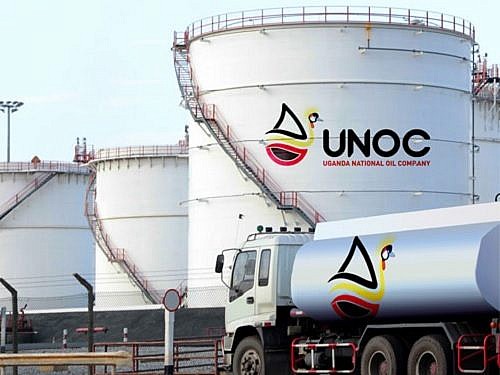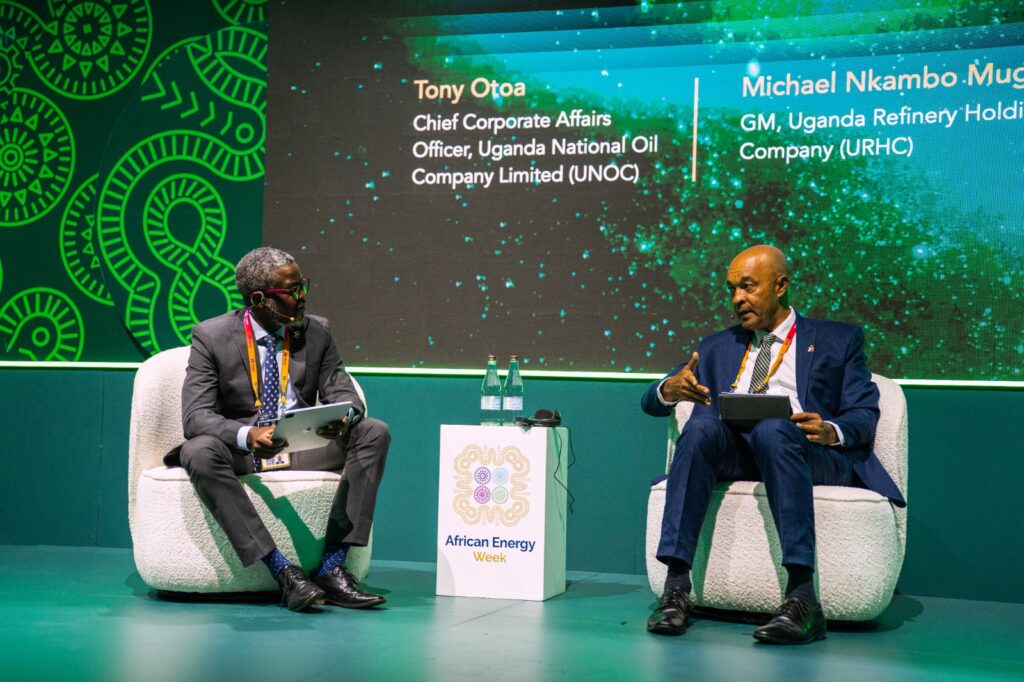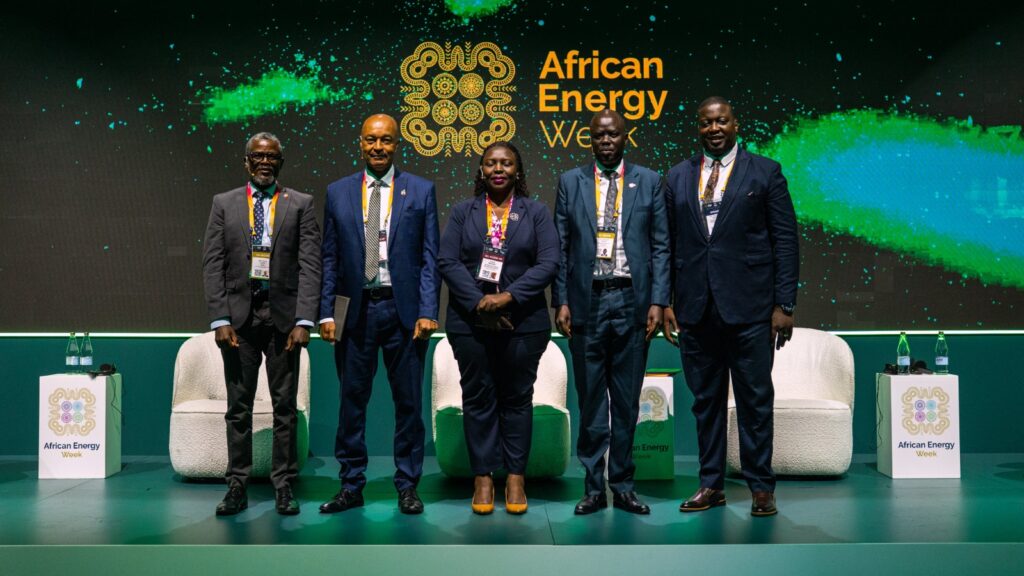
By Joseph Kiggundu
Uganda is edging closer to a defining moment in its energy journey, as the country’s first oil refinery is projected to start operations between late 2029 and early 2030 — a development set to reshape its industrial and economic landscape.
The update was shared by Michael Nkambo Mugerwa, General Manager of the Uganda Refinery Holding Company (URHC), during the Invest in Uganda panel at the African Energy Week 2025 in Cape Town.
Valued at $4 billion (UGX 15.2 trillion), the refinery will be established in Kabaale, Hoima District, and will have the capacity to process 60,000 barrels of crude oil per day. It stands among the most ambitious infrastructure investments in Uganda’s history and forms a central pillar in the country’s vision for energy self-sufficiency, industrial growth, and long-term economic transformation.

A Strategic Partnership Driving Industrialization
The refinery is being developed through a joint venture between the Uganda National Oil Company (UNOC) and Alpha MBM Investments of the United Arab Emirates. Under the arrangement finalized in March 2025, UNOC retains a 40% stake, while Alpha MBM provides 60% of the project financing.
“This refinery represents more than oil processing,” Mugerwa explained. “It’s a catalyst for Uganda’s industrial transformation — enabling downstream industries such as petrochemicals, fertilizers, kerosene, and gas production. We’re creating a value chain that extends far beyond crude refining.”
The refinery will anchor a broader integrated industrial park, already attracting billions in private investment. According to Mugerwa, investors have so far committed between $3 billion and $4 billion (UGX 11.4–15.2 trillion) to developments within the complex, with another $1–2 billion expected as work progresses.
Fifteen companies have already secured operational space within the park, which will be supported by a 200MW transmission line, upgraded road networks, and modern water systems — creating what Mugerwa described as “a new industrial city in the heart of western Uganda.”
Regional Hub for Refined Petroleum
Strategically located in the Albertine Graben region, the refinery is expected to serve not only Uganda but also neighboring markets including Tanzania, Kenya, and the Democratic Republic of the Congo (DRC). By supplying refined petroleum products within East and Central Africa, Uganda aims to position itself as a regional energy and logistics hub, reducing reliance on imported fuels and cutting transportation costs across the region.
“The refinery will ensure that value addition happens here at home,” Mugerwa emphasized. “It will strengthen our balance of trade and anchor broader industrialization.”
An Environment Ripe for Energy Investment
Speaking at the same forum, Humphrey Asiimwe, Chief Executive Officer of the Uganda Chamber of Energy and Minerals, highlighted Uganda’s strong investment fundamentals — from political stability and policy consistency to tax incentives and regional market access.
“Uganda is one of Africa’s most attractive destinations for energy investment,” Asiimwe said. “We have peace, a young and skilled workforce, zero import tax on equipment, and direct access to markets in Tanzania, Kenya, and the DRC. This combination makes the country ideal for long-term industrial ventures.”

Powering Growth Beyond Oil
While oil remains a major focus, Uganda is also investing heavily in diversifying its energy portfolio. Irene Bateebe, Permanent Secretary at the Ministry of Energy and Mineral Development, revealed that the country is targeting a 10,000 MW energy mix drawn from hydropower, solar, and nuclear sources.
Over $5 billion (UGX 19 trillion) has already been allocated to new power infrastructure projects — essential for supporting both the refinery and Uganda’s wider industrialization agenda.
“Our goal is to ensure that reliable, affordable power supports every stage of Uganda’s growth,” Bateebe said. “Energy access is not just an enabler for oil refining — it is the foundation for our economic transformation.”
UNOC Strengthens Its Upstream Footprint
Meanwhile, the Uganda National Oil Company (UNOC) continues to scale up its upstream operations. Philips Obita, UNOC’s General Manager for Upstream, noted that the company holds commercial interests in up to 150,000 barrels and remains deeply engaged in the East African Crude Oil Pipeline (EACOP) project.
He emphasized UNOC’s focus on local content, skills development, and technological independence.
“Oil and gas resources are finite,” Obita said. “Our responsibility is to ensure Ugandans gain the skills, technology, and capacity to drive the sector. We are investing in human capital so that the benefits of this industry last beyond the life of the resource.”
Obita added that five exploration projects are currently underway, with seismic surveys expected to conclude by November 2025. UNOC is also setting up an in-house geophysical services unit to reduce reliance on external contractors and enhance national expertise in oil exploration.
A Future Fueled by Self-Reliance
With financing secured, investor confidence rising, and infrastructure projects advancing, Uganda’s refinery dream is finally taking tangible shape after years of planning and negotiations.
Once operational, the refinery is expected to generate thousands of jobs, spur industrial diversification, and enhance regional trade competitiveness — aligning closely with the government’s broader Vision 2040 goal of economic self-reliance.
As Mugerwa summed it up: “This project symbolizes Uganda’s transition from exporting raw materials to exporting refined value. It’s not just an oil refinery — it’s the engine of a new industrial Uganda.”